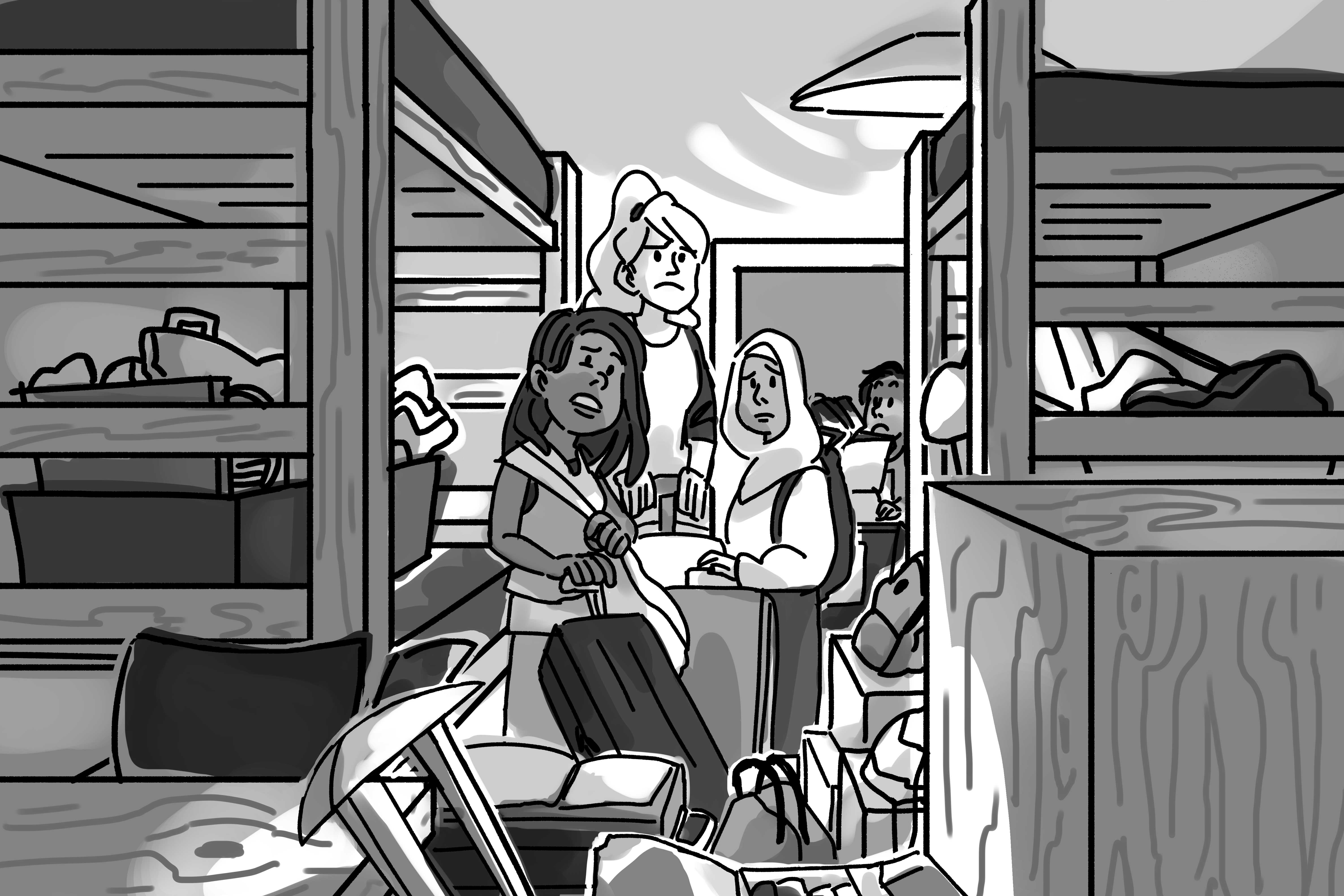Campus is getting cramped and it hasn’t gone unnoticed. The Class of 2022 is the largest in recent history with about 2,800 freshmen, and the effects of the large class can be seen across campus.
While more students can be spun as a good thing with more participation in student organizations and more money for the University from tuition, this increase in class size only exacerbates existing issues on campus. Many of the problems that students face, like cramped residence halls and long lines to meet with advisers, are linked to having too many students on campus. Despite adding class sections and making room for students in residence halls, the University has not properly prepared for a significant increase in class size for the Class of 2022. While 300 more freshmen than usual may not seem like a lot now, if this pattern continues, the way of living for new and current students will increasingly become less sustainable and enjoyable.

Cartoon by JEANNE FRANCHESCA DELA CRUZ
While the University cannot guarantee the number of students who decide to come to GW and this year’s class occurred when an unexpected number of freshmen committed to GW, administrators need to recognize the strain that current students already feel on campus.
Housing is one example of a limited resource on campus. About 150 freshmen have been placed in Fulbright Hall, which is traditionally an upperclassman residence hall. In some cases, four freshmen have been assigned to each room, even though the rooms were originally intended for three students.
The reality that these students face is likely a far cry from the expectations they had while preparing for their first year at GW over the summer and although the University has made attempts to mitigate these large issues, this isn’t a sustainable future for students.
Housing is just one issue that students will face due to the unexpected increase in the size of the student body. While it is only a minor inconvenience now to spend a few extra minutes in line for food around campus at places like District House, if the number of students continues to increase, food insecurity could become a larger problem because it is already difficult for students to find quick and affordable options on campus, especially without a traditional dining hall.
There are also many student resources that already seem to be overworked and understaffed. Bringing more students to campus without addressing this issue is irresponsible, especially because long wait times to see health professionals and advisers have larger effects to students’ health and academic experience. GW should plan to hire a substantial amount of additional staffers in its student advising, health services and financial aid offices to accommodate the influx of students. Students shouldn’t have to wait hours for basic services because the University has more students than it can handle.
The University has attempted to combat some of these problems. A few outdoor spaces were expanded last week, but this doesn’t solve the problem during the colder seasons or on rainy days. The issue with finding somewhere to sit isn’t just about eating and socializing, it’s also a problem when it comes to studying. It’s already hard enough to find somewhere to sit in Gelman Library, especially during finals and midterms. But, major buildings on campus – like Duques Hall, Corcoran Hall and the Elliott School of International Affairs – are not open late into the night or are closed on weekends. It may cost the University more to keep these buildings open later, but it would be worth it to improve the student experience by providing more places to study so students don’t have to rush to find a seat.
GW began planning in the spring to build a new residence hall on campus and make renovations to Thurston Hall. But, those renovations and new spaces will take time and won’t benefit current students.
These problems cannot be pushed off. While University President Thomas LeBlanc has prioritized the student experience, that focus must also translate to issues that seem smaller because these are the problems that affect students on a daily basis.
While it’s important that student voices are heard, it shouldn’t be on students to fix these problems. It is the responsibility of the University, to make students time here worthwhile.
Officials need to take immediate action in creating more space on our already overcrowded campus and provide more resources for students. While a few hundred more freshmen may not seem like much, if the number continues to grow, it will be more and more noticeable for all students on campus. The University is responsible not only for education, but also for ensuring that all students have an enjoyable college experience. The overcrowding of dorms, shared spaces and academic services is detrimental to that goal, and the University should take decisive action sooner rather than later.
The editorial board is composed of Hatchet staff members and operates separately from the newsroom. This week’s piece was written by opinions editor Renee Pineda and contributing opinions editor Kiran Hoeffner-Shah based on conversations with The Hatchet’s editorial board, which is composed of managing editor Matt Cullen, design editor Zach Slotkin, managing director Elise Zaidi, sports editor Barbara Alberts and culture editor Margot Dynes.

